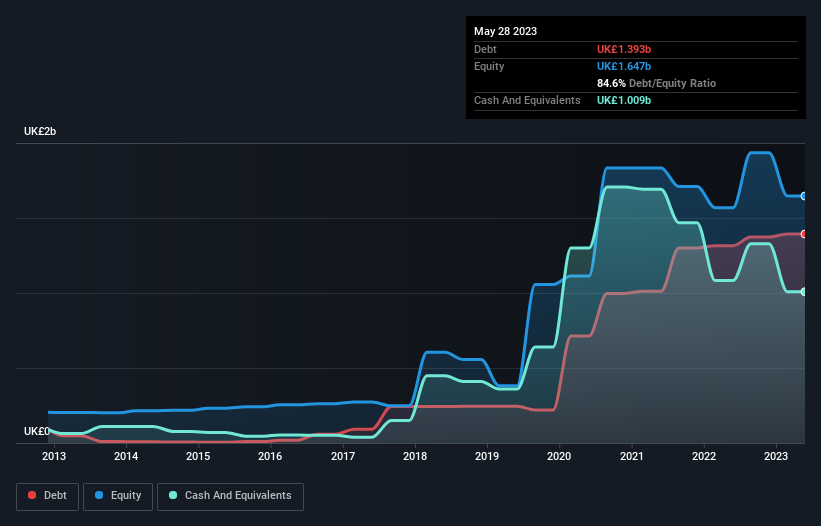- United Kingdom
- /
- Food and Staples Retail
- /
- LSE:OCDO
Here's Why Ocado Group (LON:OCDO) Can Afford Some Debt
Legendary fund manager Li Lu (who Charlie Munger backed) once said, 'The biggest investment risk is not the volatility of prices, but whether you will suffer a permanent loss of capital.' So it might be obvious that you need to consider debt, when you think about how risky any given stock is, because too much debt can sink a company. As with many other companies Ocado Group plc (LON:OCDO) makes use of debt. But the more important question is: how much risk is that debt creating?
What Risk Does Debt Bring?
Debt and other liabilities become risky for a business when it cannot easily fulfill those obligations, either with free cash flow or by raising capital at an attractive price. In the worst case scenario, a company can go bankrupt if it cannot pay its creditors. However, a more usual (but still expensive) situation is where a company must dilute shareholders at a cheap share price simply to get debt under control. Having said that, the most common situation is where a company manages its debt reasonably well - and to its own advantage. When we examine debt levels, we first consider both cash and debt levels, together.
See our latest analysis for Ocado Group
What Is Ocado Group's Debt?
The image below, which you can click on for greater detail, shows that at May 2023 Ocado Group had debt of UK£1.39b, up from UK£1.32b in one year. On the flip side, it has UK£1.01b in cash leading to net debt of about UK£384.7m.

How Strong Is Ocado Group's Balance Sheet?
Zooming in on the latest balance sheet data, we can see that Ocado Group had liabilities of UK£569.9m due within 12 months and liabilities of UK£2.27b due beyond that. On the other hand, it had cash of UK£1.01b and UK£308.9m worth of receivables due within a year. So its liabilities total UK£1.52b more than the combination of its cash and short-term receivables.
This deficit isn't so bad because Ocado Group is worth UK£4.41b, and thus could probably raise enough capital to shore up its balance sheet, if the need arose. But it's clear that we should definitely closely examine whether it can manage its debt without dilution. The balance sheet is clearly the area to focus on when you are analysing debt. But it is future earnings, more than anything, that will determine Ocado Group's ability to maintain a healthy balance sheet going forward. So if you want to see what the professionals think, you might find this free report on analyst profit forecasts to be interesting.
Over 12 months, Ocado Group reported revenue of UK£2.6b, which is a gain of 7.4%, although it did not report any earnings before interest and tax. That rate of growth is a bit slow for our taste, but it takes all types to make a world.
Caveat Emptor
Over the last twelve months Ocado Group produced an earnings before interest and tax (EBIT) loss. Indeed, it lost UK£420m at the EBIT level. Considering that alongside the liabilities mentioned above does not give us much confidence that company should be using so much debt. So we think its balance sheet is a little strained, though not beyond repair. However, it doesn't help that it burned through UK£701m of cash over the last year. So suffice it to say we consider the stock very risky. When analysing debt levels, the balance sheet is the obvious place to start. But ultimately, every company can contain risks that exist outside of the balance sheet. Be aware that Ocado Group is showing 2 warning signs in our investment analysis , you should know about...
Of course, if you're the type of investor who prefers buying stocks without the burden of debt, then don't hesitate to discover our exclusive list of net cash growth stocks, today.
New: AI Stock Screener & Alerts
Our new AI Stock Screener scans the market every day to uncover opportunities.
• Dividend Powerhouses (3%+ Yield)
• Undervalued Small Caps with Insider Buying
• High growth Tech and AI Companies
Or build your own from over 50 metrics.
Have feedback on this article? Concerned about the content? Get in touch with us directly. Alternatively, email editorial-team (at) simplywallst.com.
This article by Simply Wall St is general in nature. We provide commentary based on historical data and analyst forecasts only using an unbiased methodology and our articles are not intended to be financial advice. It does not constitute a recommendation to buy or sell any stock, and does not take account of your objectives, or your financial situation. We aim to bring you long-term focused analysis driven by fundamental data. Note that our analysis may not factor in the latest price-sensitive company announcements or qualitative material. Simply Wall St has no position in any stocks mentioned.
About LSE:OCDO
Ocado Group
Operates as an online grocery retailer in the United Kingdom and internationally.
Moderate growth potential and slightly overvalued.
Similar Companies
Market Insights
Community Narratives




